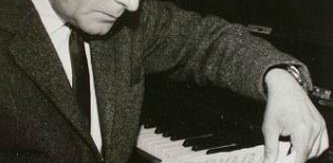First of all, the closing piece of the concert, a double concerto for violin, viola and small orchestra, lifted his spirits. The composition entitled “Janus” is quite fresh, it was commissioned by the Salzburger Festspiele in 2012. The two soloists, Muriel Cantoreggi (violin) and Geneviève Strosser (viola), gave an excellent performance. The two artists with quite a different disposition, appearance and charisma became the perfect medium of the composition, because the piece was not driven exclusively by the dichotomy of the (Janus-faced) composition technique, but also by the simultaneous presence of contradicting tones. As if the performing instructions for the material of the two soloists included in Holliger’s partiture had been complementary to one another. When the violin was lamenting, the viola was hopeful; when the violin was lively, the viola was reserved, when the violin sounds were accentuated, those of the viola were airy, and so on. This particularly communicative and expressive music reminded me of the most beautiful instances of classical modernity. Yet Holliger decided to transcend this classical tradition in every single detail of the composition, what is more, he even cast doubt on the relevance of this tradition. It was a piece modern in spirit and postmodern in arrangement. One of the most beautiful moments may have been when, according to the logic of modernity, the cadenza of solo instruments (the solos creating the illusion of free improvisation) should have followed, but instead a floating generated by the orchestra’s chance elements (aleatory music) could be heard. And when we returned to “modernity”, it was either a mixed bag or a dramatic failure: it is a matter of taste which feels appropriate. The whole composition sank to whispers and noises despite the exuberance preceding the “positive” culmination. We heard a grandiose and significant piece with a clear structure, and besides the already praised soloists we can only give maximum appreciation to the “contemporary music oeuvre” of the great Budapest Festival Orchestra.
The other Holliger piece of the evening reminds me of the excellence of the orchestra. Composed in 2012 as well, META ARCA, a movement full of “spectacular” larger-than-life characters, was really rewarding for the string section of the Festival Orchestra, who took advantage of it. The actions of Holliger, who also undertook the conducting burden, proved that conducting is not particularly difficult, and there is great mystique attached to it. Holliger used only a few movements for the conducting that were nevertheless concise and without any kind of mimesis of charisma. All this was experienced during the second part of the concert.
In the first part the 6 little piano pieces by Arnold Schoenberg (or rather, a recomposed and reinterpreted ensemble version by Holliger for a string and wind quintet as well as an ensemble of a piano, a harmonium, a celesta and a harp) and the orchestra cycle entitled Orbis tonorum completed by Sándor Veress in 1986 were played. The former is a sample of aphoristic expressivity already reviewed a number of times, and just like at the time of Schoenberg when musical concentrates were invented, Holliger also played the piece comprising not even one-minute long movements twice. When recomposing, Holliger did not try to exaggerate or underline gestures but rather to sharpen, deepen and broaden the sound, and placed the original piece in the world of euphony and sensuously pleasing sound. It (along with the performance) turned out to be really beautiful, it is just no use performing it in this form twice in succession.
One of the greatest Hungarian composers forced to move abroad was probably Sándor Veress. The maestro, who died in 1992, is deeply respected in his chosen homeland, in Switzerland, even today. Despite considerable and noble efforts, his oeuvre has not yet attracted general acclaim in the “old country”. With pieces such as Orbis tonorum, the broader public could perhaps be easily persuaded, but I only felt the kind of respect Wittgenstein had. But let me not be misunderstood, we witnessed a grand concert on 25 April.


